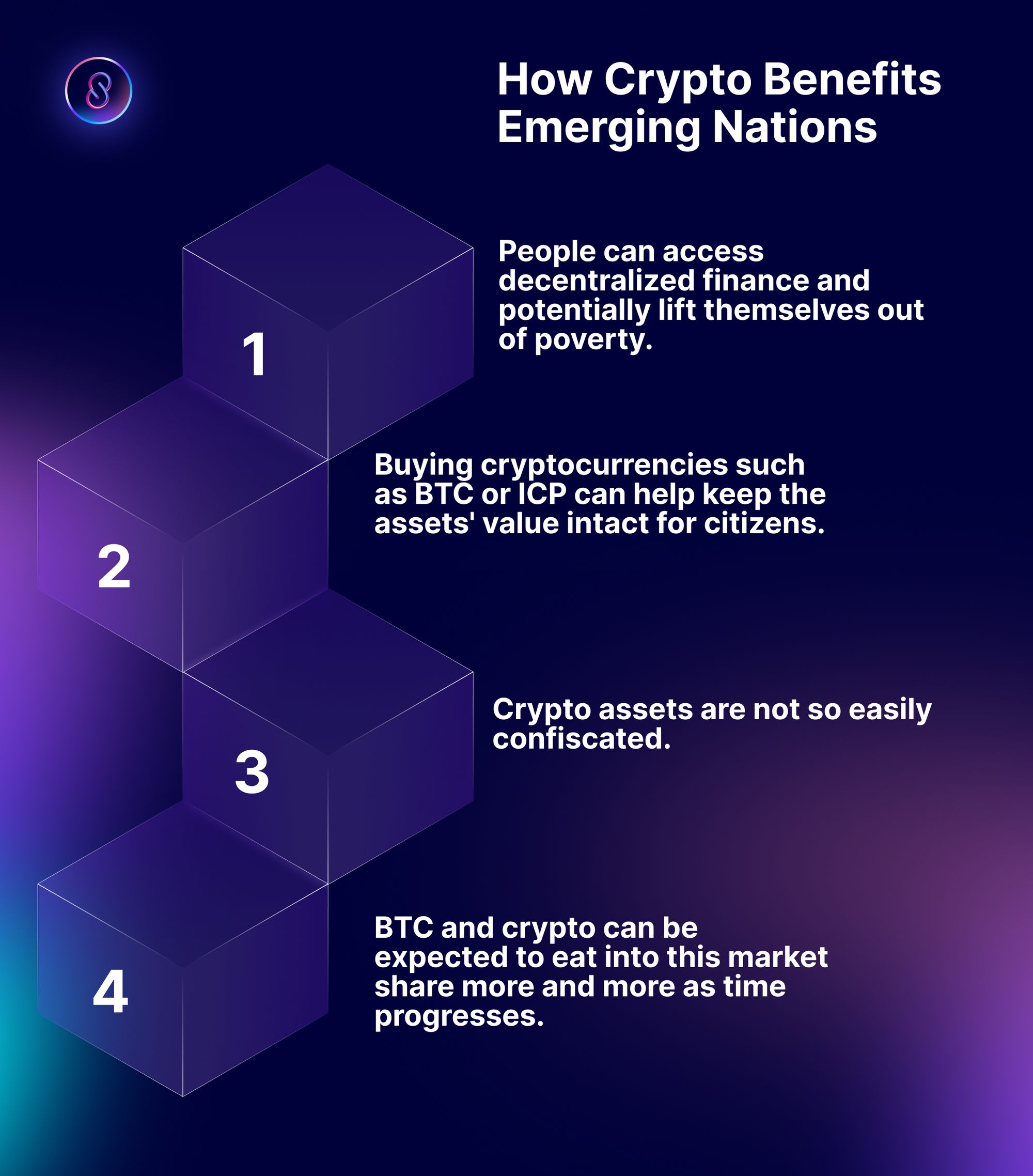The Future of Crypto: How It Could Shape the Global Economy
The traditional financial structures of the world should see a shift in how they do business. Services that were traditionally overseen by banks and governments, such as loans and mortgages, will become more easily accessible to people through DeFi platforms.

Since the introduction of BTC in the aftermath of the 2008 financial crash, much has changed. From the early days of BTC, when enthusiasts were buying pizzas for thousands of coins (worth millions today), to now, the entire cryptocurrency industry as we know it has developed. In the space of fifteen years, cryptocurrency has become a trillion-dollar industry from essentially nothing. Makes you think there might be something in it...
BTC was introduced in order to upset the apple cart, to change the global financial system into something better for society. It was purpose-built to disrupt, and it has so far been successful. Left and right it seems analysts and experts go from BTC opponents to BTC evangelists, as they realize that the technology is bulletproof. Those with interests not aligned with a decentralized future tend to oppose and then later on capitulate. The decentralized, permissionless, trustless nature of BTC means that those that would seek to tear it down and control do not have the power to do so.
By creating an alternative to the traditional global financial system, BTC has changed the world already. Not too long ago, there was nowhere to store money outside of conventional finance, and investors lived and died by the options made available to them by their broker. Today, the financial landscape is quite different, with crypto providing a huge amount of options for asset allocation, all of which can be managed by the individual, in the spirit of self-custody.
A Hedge Against Inflation
One huge benefit of allocating assets to cryptocurrencies is protection from inflation. While each crypto coin has its own tokenomics specific to the individual project, most have little or no inflation baked in. Some are even deflationary. Inflation conditions of a given coin are largely transparent and predictable.
BTC for example has a fixed supply of 21 million coins, which are unlocked over time through mining. This fixed supply means that inflation through the increase in the token supply is not something a BTC holder will ever need to worry about. This is a huge selling point for BTC.
As the IC is a more comprehensive network than a simple crypto coin, both inflationary and deflationary mechanisms are built into ICP tokenomics, in order to provide rewards for stakers and ensure other network functions are carried out correctly.
These predictable and largely algorithmically driven mechanisms used for control of inflation and deflation stand in stark contrast to fiat currencies such as the US Dollar and the Euro, which can be printed whenever the central bank says so. This printing of currency dilutes the circulating monetary supply and makes the dollar that you hold worth less and less over time.
Incredibly, the protection from inflation that BTC introduced to the world never existed before. The reduced buying power of fiat currency was simply a fact of life, which could not be altered. The BTC solution to inflation is in itself a huge change for the global economy.
How Crypto Benefits Emerging Nations

Perhaps the greatest benefit resulting from BTC and cryptocurrency adoption globally will be felt in developing countries. In the past, living in certain underprivileged countries meant that a person must suffer a guaranteed life of poverty. Cryptocurrency has the power to change this. Now, with only a phone and an internet connection, a person can access decentralized finance and potentially lift themselves out of poverty. In a world where connectivity is constantly improving, with 6.8 billion smartphones in existence, access to these services is getting better and more widespread.
In conditions of hyperinflation, such as those seen in Argentina, Venezuela, or Turkey in recent years, cryptocurrency can provide a safe haven for assets. While native fiat currencies in such countries are losing their value in real-time, buying cryptocurrencies such as BTC or ICP can help to keep the value of assets intact for citizens. For those averse to the risk inferred by volatility, there are always stablecoins.
The stablecoin market makes up a large chunk of the cryptocurrency market as a whole, and for good reason. The dollar's status as the global reserve currency means that 65 countries peg their currencies to the dollar, while 11 foreign countries use it as their official currency. For those living in developing countries outside of those countries which transact using the dollar, having access to the stablecoin market can be extremely beneficial, allowing them to store their assets in USD, which will hold its value better than their native currency.
Being able to store assets out of the reach of governments can be huge for some people. While assets stored in the traditional banking system can be sequestered by a corrupt government that decides that it does not like the actions of a citizen, crypto assets are not so easily confiscated. Their decentralized nature makes them next to impossible to confiscate, without somehow obtaining the seed phrase of the owner.
Many people living in developing nations must emigrate in order to earn an improved living. The fast and lightweight nature of global transactions is huge for those that work abroad, and wish to send money home to family members. While banks often have large fees associated with international wire transfers, BTC transfers are extremely cheap, fast, and reliable, compared to banks which have a wait time of days or weeks for clearance of wire transfers carried out internationally.
Western Union has reported revenues in excess of $1 billion per quarter; it is clear that sending money internationally is big business. BTC and crypto can be expected to eat into this market share more and more as time progresses.
El Salvador
On September 7, 2021, El Salvador became the first country in the world to accept BTC as legal tender, when the Bitcoin Law was introduced.
The country's president, Nayib Bukele, has faced his fair share of critics over the move, with many saying that it would not work out. So far, over a year later, the move has not caused any serious problems for the financial health of the country, even in the face of a drop in the price of BTC.
Citizens of El Salvador were each airdropped $30 worth of BTC to incentivize the changeover and bring all residents of the country on board with the change. Now it is possible to transact in the majority of stores in El Salvador using BTC.
Should the template laid down by El Salvador for the creation of a BTC-friendly nation prove successful in the coming years, we can expect many more countries to follow suit and implement similar changes. Such implementations would be not only bullish for the price of BTC and cryptocurrency as a whole, (and ICP!), but would also be a huge step forward for the public image and perception of crypto.
NFTs

The future of E-Commerce and online business could well be shaped by the adoption of NFT technology over the coming years. The use cases for NFTs are extremely broad. They can be used for everything from concert tickets to proof of purchase, art, and gaming. The use cases really are only limited by the imagination of developers.
The IC provides the most comprehensive infrastructure in web3 for the creation of NFTs. On the IC network, NFTs can be created completely on-chain, with all metadata for NFTs being stored on the IC network.
So far, a whole bunch of companies have taken the plunge with NFTs, and many more are exploring potential use cases for NFT technology. Companies such as Coca-Cola, Adidas, Porsche, and many more, have shown an interest in exploring the use cases of NFTs.
As NFT technology is developed further in the coming years, the global economy stands to see a shift in the way that business is carried out, and companies are likely to shift towards crypto as they learn more about the benefits which can be gained from getting involved.
Will Crypto Really Have That Great an Impact?

It looks as though cryptocurrencies have the power to change the world as we know it over the coming years and decades. People who once had very few opportunities available to them now have access to the whole financial system. This change in the financial landscape is unprecedented and has not been seen in the world before.
As a result of cryptocurrency adoption, it is likely that we see standards of living improve in some of the world's poorest countries, provided that they are able to achieve the required level of connectivity and freedom of information.
The traditional financial structures of the world should see a shift in how they do business. Services that were traditionally overseen by banks and governments, such as loans and mortgages, will become more easily accessible to people through DeFi platforms, the likes of which will be hosted on the IC network.
As the network effect of the crypto industry grows, there will be a snowball effect; more users will mean more users. Once we reach that point of terminal velocity, the world will see significant changes.
The IC will be at the forefront of this change.

Connect with InfinitySwap
Bitfinity Wallet |AMM | Twitter | Website | Telegram | Discord | Github






Comments ()